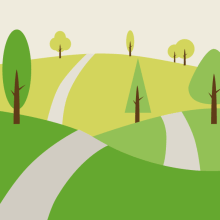With funding from the Scottish Government, Quarriers, Epilepsy Connections and Epilepsy Scotland worked with Iriss to develop a national approach for commissioners to improve the availability of social support for people with an epilepsy diagnosis. Social support takes many forms, from peer support groups; to phone support from a national helpline; to formal counselling; or even taking part in activities organised by epilepsy organisations.
We began working on this project in 2023; we published the resource last month, and we launched it with an online session on 30th May. We welcomed over 30 attendees, and heard from clinicians, people with lived experience and had a keynote interview between Ron Culley, CEO of Quarriers, and Angiolina Foster, director of Public Health Scotland.
Something Angiolina said in her keynote, has resonated with our experiences of building this resource, and learning more about what social support is; and what it means to people. She said:
“Health does not rest in the hands of healthcare... it is created: in communities, in good homes, in jobs, in education.”
Throughout the creation of this resource, we’ve heard from people with lived experience, about the ways in which social support augments and layers with much needed clinical interventions, to provide holistic support. And this was part of Angiolina’s point; not that medicine and clinical interventions are not essential, crucial ingredients for good health; but that health is shaped and maintained beyond hospital and doctors surgery walls.
Practitioners told us about the ways they can complement clinical staff input, by preparing people for appointments with epilepsy specialist nurses. The ways they can ensure people have the information they need to stay well; by having time that clinicians don’t always have, to debrief after appointments and signpost people to other resources. And clinicians shared this perspective with us too. They know that their role is a part of a whole, and that their essential contribution is complemented by the social support provided by epilepsy organisations.
Angiolina also told us about the role of prevention in PHS’s mission, asking:
“Why is prevention such an important part of Public Health Scotland’s mission? The reason is because prevention works.”
This also resonates with what we heard about social support. We heard how helplines and counselling services can support people to rebuild their mental health, or stop them from reaching rock bottom. People shared about the importance of peer support in preventing individuals from getting lost in the isolation that living with a chronic illness can cause.
Despite the protective and preventive capabilities that social support has for people with epilepsy, there were sobering reflections. The challenges that organisations are facing in funding their much needed support services are very real. A recent survey from Epilepsy Consortium Scotland members shows a funding shortfall of £357,636 for total costs in the 2024/25 period. And, this doesn’t include the services that have had to close due to a loss of funding.
However, as a project team, we’ve found hope for change in this resource, and in the connections made through creating it. The resource itself provides commissioners with a set of questions to move towards commissioning sustainable support services. We think, that if acted upon, this can support increased availability of social support in Scotland.
It also serves as a springboard for conversations around social support for people with epilepsy; conversations about sustainable funding; about preventative care and support; and the real change it can make for people living with epilepsy.
We think the resource has value for everyone, but if you’re a commissioner or a policy maker this resource is for you to use, to make a difference to the lives of people with epilepsy. The hospital manager of the Quarriers Scottish Epilepsy Centre, a member of the Steering Group for this work, summed it perfectly. She said:
“there’s room for all of us in taking this work forward.”
So with that, we encourage you to read and use this resource. Be part of taking it forward. And, let us know how you get on: hannah.martin@iriss.org.uk and louise.bowen@iriss.org.uk




